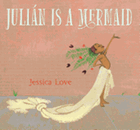
Riding the subway after a visit to the pool with his grandmother, young Julián notices three glamorous fellow passengers he's convinced are mermaids. "Julián LOVES mermaids." On the stroll home, he asks, "Abuela, did you see the mermaids?" Walking in sync, she replies, "I saw them, mijo." That confirmation is all Julián needs to reveal, "Abuela, I am also a mermaid."
At home, Abuela announces she's off to take a bath. Left alone, Julián gets down to the business of self-expression. Stripping his outer layers, he crowns himself with ferns and flowers, drapes himself to create a curtain-tail and strikes a perfect pose. But when his towel-wrapped Abuela re-emerges, her unexpected look of disapproval makes his fronds droop: "Uh-oh."
Her silent exit makes Julián self-consciously reexamine himself in the nearest mirror, until Abuela returns to surprise him with the crowning accessory: pink pearls. "For me, Abuela?" the delighted child asks. "For you, Julián." Abuela takes his hand and leads him outside. Their short stroll culminates in a beachside Carnival-like celebration, where wide-eyed Julián whispers with incredulous joy: "Mermaids." While he shyly peeks around a corner, Abuela confirms, "Like you, mijo," as she beckons him forward with an outstretched hand: " 'Let's join them.' And they did."
The words here are succinctly sparse; the art is spectacular, proof that a picture is worth a thousand words. What Abuela and Julián don't tell one another with their voices, debut author/illustrator Jessica Love inventively shows on the page. Love's Broadway performance background is clearly at play throughout, with many of her characters flowingly, enviably swathed. Across her watercolor, gouache and ink spreads, Love captures the transformative power of being seen. Her affecting combination of the literary and the visual results in a powerful affirmation of individuality, creative expression and unconditional acceptance. --Terry Hong, Smithsonian BookDragon

